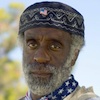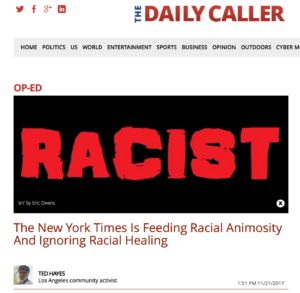28 Nov 2017 Gray Lady Apologizes for Neo-Nazi Profile, But Not Hateful Commentary Criticized by Project 21
In a recent Daily Caller commentary, Project 21 member Ted Hayes called out the New York Times and Cardozo Law Professor Ekow N. Yankah for a hateful piece in the Times in which the professor explained why he tells his black children they cannot be real friends with white people.
 “Our nation is better than this man thinks,” said Ted, a community activist living in Los Angeles. “It’s foolish to think racism no longer exists. It does. But it is not who we are as a people. We have come so far, and those who deny our progress prolong the lingering remnants of racial animosity.”
“Our nation is better than this man thinks,” said Ted, a community activist living in Los Angeles. “It’s foolish to think racism no longer exists. It does. But it is not who we are as a people. We have come so far, and those who deny our progress prolong the lingering remnants of racial animosity.”
In his essay, which is particularly critical of President Trump’s supporters, Yankah suggested, “History has provided little reason for people of color to trust white people in this way, and these recent months have put in the starkest relief the contempt with which the country measures the value of racial minorities.”
In response, Ted explained:
Playing the race card, as Yankah did in the New York Times (consciously or not), is a very dangerous practice. It fosters strife, hatred, and division.
When he accuses all white citizens of racism, Yankah violates the warning of Jesus Christ not to offend children by wanting to teach his own children and others to enter a path of hatred. When he spoke of “the little boys I love” and that “I first have to keep my boys safe…,” why does he not seem willing to warn them about the hypocritical psychosis of Black Lives Matter activists?
It seems Yankah won’t acknowledge that, in many areas under the political dominance of the Trump resistance, his beloved sons are more at risk from fellow black youth than from police officers or white nationalists who fill leftist rhetoric.
Yankah’s use of the term “people of color” is also racist because it justifies non-whites by their skin color and not their merit. Conversely, whites become evil because they are white. Yet it’s the allegedly untrustworthy white people who published his words and place him on the front lines attacking President Trump. It’s this acrimony that prevents the president from assisting black citizens as he promised and getting any credit for doing so.
Yankah’s sons are empowered by the 14th Amendment. Despite his credentials as a law professor, his rhetoric ignores authority granted to black citizens by white lawmakers, in the wake of the nation’s civil war, who fought to abolish chattel slavery. He also ignores the 2005 U.S. Senate apology for lynchings and the 2008 congressional resolution apologizing for slavery and Jim Crowism.
That the Times has not had second thoughts about Yankah’s piece is surprising considering that the paper has since essentially offered an apology for running an article about a neo-Nazi that some readers felt helped “normalize” a radical. Times editor Marc Lacey stood by the notion of “the need to shed more light, not less, on the most extreme corners of American life and the people who inhabit them.” Yet he nonetheless expressed regret for showing that a hater can also eat at Panera, play Nintendo games and watch “Seinfeld” (not that there’s anything wrong with that).
What seems to be lost on the Times in all of this is that white nationalist Ted Hovater, a blue-collar welder, is part of society and may someday find error in his ways because of his interactions with others. Yankah, a professor at an elite school, is urging racial separation in a manner from which there seems to be no escape. That poses a much dimmer future for American race relations. “Due to his distrust of whites,” Ted surmises, “[Yankah] ignores their good faith, bold actions and necessary role in forging a truly equal America. I pray his sons will be more trusting.”




